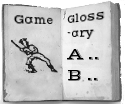Long Ball (European baserunning game): Difference between revisions
No edit summary |
m (Larry moved page Long Ball to Long Ball (European baserunning game)) |
||
| (4 intermediate revisions by 2 users not shown) | |||
| Line 2: | Line 2: | ||
|Term=Long Ball | |Term=Long Ball | ||
|Game Family=Baseball | |Game Family=Baseball | ||
|Game | |Game Regions=Europe, US | ||
|Game Eras=Predecessor, 1800s, Post-1900 | |||
|Invented Game=No | |||
|Description=<p>Maigaard sees Long Ball as the oldest ancestor of rounders, cricket and baseball, a game that was played in many countries. Long Ball is described as using teams of from 4 to 20 players. It involved a pitcher, batter, and an “out-goal” or base that the batter-runner tried to reach after hitting (or after missing a third swing) and without being plugged. Caught flies signaled an immediate switch between the in-team and the out-team. Many members of the in-team could share a base as runners. Runs were not counted, as the objective was to remain at bat for a long period. A 1914 US text describes Long Ball in generally similar terms, but one that uses a regular "indoor baseball." There is a single base to run to, scoring by runs, a three-out-side-out rule, and no foul ground. Plugging is allowed.</p> | |Description=<p>Maigaard sees Long Ball as the oldest ancestor of rounders, cricket and baseball, a game that was played in many countries. Long Ball is described as using teams of from 4 to 20 players. It involved a pitcher, batter, and an “out-goal” or base that the batter-runner tried to reach after hitting (or after missing a third swing) and without being plugged. Caught flies signaled an immediate switch between the in-team and the out-team. Many members of the in-team could share a base as runners. Runs were not counted, as the objective was to remain at bat for a long period. A 1914 US text describes Long Ball in generally similar terms, but one that uses a regular "indoor baseball." There is a single base to run to, scoring by runs, a three-out-side-out rule, and no foul ground. Plugging is allowed.</p> | ||
<p>A weblog written in the Australian outback in 2007 described a version of contemporary Long Ball.</p> | <p>A weblog written in the Australian outback in 2007 described a version of contemporary Long Ball. Modern variants of Long Ball are still played on a club or school basis, including Danish Longball in Denmark and England, <em>Schlagball</em> in Germany and Silesia and <em>Palant</em> in Poland.</p> | ||
|Sources=<p><span>Per Maigaard, "Battingball Games," </span><em>Genus</em><span> 5 </span>(1941)<span>. Reprinted as Appendix 6 in David Block, <span style="text-decoration: underline;">Baseball Before We Knew It</span> (U. Nebraska, 2005), pages 260ff.</span></p> | |Sources=<p><span>Per Maigaard, "Battingball Games," </span><em>Genus</em><span> 5 </span>(1941)<span>. Reprinted as Appendix 6 in David Block, <span style="text-decoration: underline;">Baseball Before We Knew It</span> (U. Nebraska, 2005), pages 260ff.</span></p> | ||
<p><span><span>Henry S. Curtis, </span><em>Play and Recreation for the Open Country</em><span> </span>(Ginn, 1914)<span>. pages 62-63.</span></span></p> | <p><span><span>Henry S. Curtis, </span><em>Play and Recreation for the Open Country</em><span> </span>(Ginn, 1914)<span>. pages 62-63.</span></span></p> | ||
|Has Supplemental Text=No | |||
}} | }} | ||
Latest revision as of 12:37, 7 February 2021
| Game | Long Ball |
|---|---|
| Game Family | Baseball |
| Location | |
| Regions | Europe, US |
| Eras | Predecessor, 1800s, Post-1900 |
| Invented | No |
| Tags | |
| Description | Maigaard sees Long Ball as the oldest ancestor of rounders, cricket and baseball, a game that was played in many countries. Long Ball is described as using teams of from 4 to 20 players. It involved a pitcher, batter, and an “out-goal” or base that the batter-runner tried to reach after hitting (or after missing a third swing) and without being plugged. Caught flies signaled an immediate switch between the in-team and the out-team. Many members of the in-team could share a base as runners. Runs were not counted, as the objective was to remain at bat for a long period. A 1914 US text describes Long Ball in generally similar terms, but one that uses a regular "indoor baseball." There is a single base to run to, scoring by runs, a three-out-side-out rule, and no foul ground. Plugging is allowed. A weblog written in the Australian outback in 2007 described a version of contemporary Long Ball. Modern variants of Long Ball are still played on a club or school basis, including Danish Longball in Denmark and England, Schlagball in Germany and Silesia and Palant in Poland. |
| Sources | Per Maigaard, "Battingball Games," Genus 5 (1941). Reprinted as Appendix 6 in David Block, Baseball Before We Knew It (U. Nebraska, 2005), pages 260ff. Henry S. Curtis, Play and Recreation for the Open Country (Ginn, 1914). pages 62-63. |
| Source Image | [[Image:|left|thumb]] |
| Comment | Edit with form to add a comment |
| Query | Edit with form to add a query |
| Has Supplemental Text |
Comments
<comments voting="Plus" />
